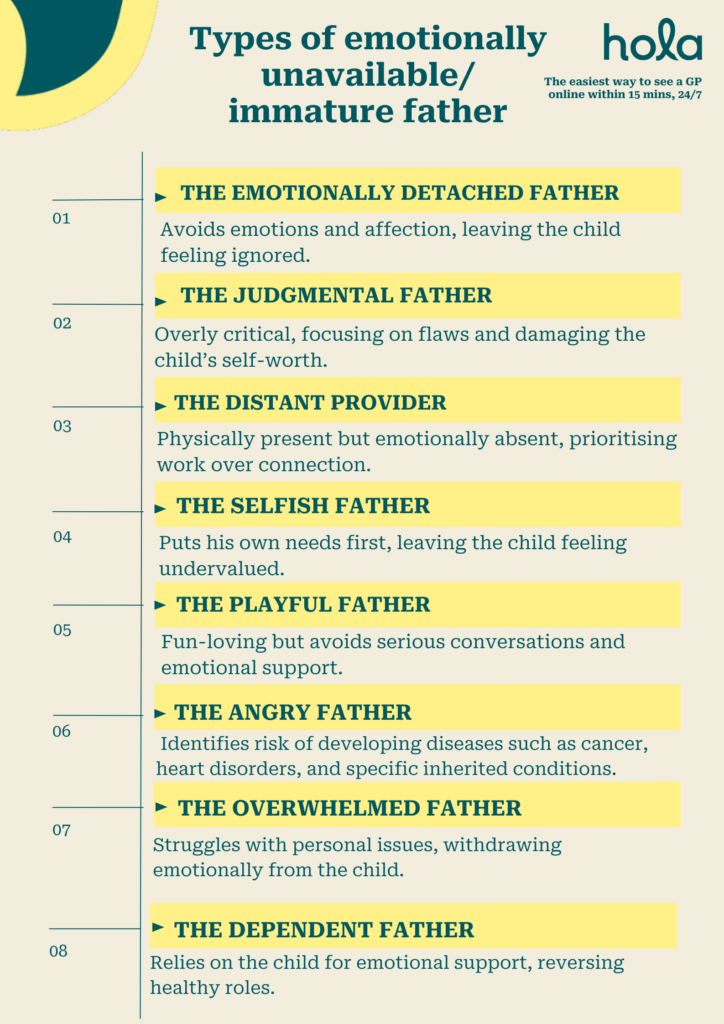Signs of an emotionally unavailable father: Therapist’s guide
Written by editorial staff writer at Hola. Medically reviewed by Amira Shah, MA in Counselling Psychology, Registered Psychotherapist.

Contents

Summary: An emotionally unavailable father can affect a child’s emotional growth, leading to feelings of neglect, diminished self-esteem, and difficulty forming strong relationships. Signs include a lack of emotional nurturing, reluctance to show vulnerability, inconsistent actions, and neglect of the child’s needs. Therapy, such as attachment-based or emotion-focused approaches, can help heal these issues and strengthen emotional bonds.
Growing up with an emotionally unavailable father can feel like trying to connect with someone who is always beyond your grasp, much like playing a game of emotional hide-and-seek. While he may be physically present, his emotional distance can leave you feeling neglected and disconnected. Let’s explore the signs of emotional unavailability in fathers and how to overcome these emotional barriers!
How do you know if your father is emotionally unavailable?
You might recognise that your father is emotionally unavailable if:- He avoids emotional conversations
- He hardly shows affection
- He is physically present but emotionally distant
- He uses toxic language
- He prioritises work over family and children
- He chooses personal luxuries over the child’s needs
- He shows more kindness to others than to his family
- Lack of involvement in children’s activities or interests
- He engages in substance use
- He avoids responsibility and shifts the blame onto the child
- He withdraws during emotional or stressful situations
What does an emotionally distant father look like?
An emotionally unavailable father often appears distant, detached, or unapproachable, even when he is physically present. He may refrain from showing affection, avoid emotional discussions, and struggle to connect on a deeper level. He might meet practical or financial needs, but seldom provides emotional warmth, support, or encouragement. When you are upset, he may come across as dismissive, uncomfortable, or quiet, forcing you to handle your emotions alone. He may seem emotionally cold, difficult to understand, or even indifferent, leading to confusion or emotional pain, especially when you crave a closer emotional bond.Also read: Emotional dysregulation: Best ways to cope
Take control of your mental health. Begin your care plan now.
Types of emotionally unavailable/immature father
Emotionally unavailable or immature fathers can appear in different forms, often leaving children feeling abandoned, unsupported, or emotionally detached. Here are a few common types:- The emotionally detached father: This type of father avoids expressing or talking about emotions. He may keep his feelings to himself, have trouble displaying affection, and struggle with emotional closeness. His emotional detachment can make the child feel ignored or unimportant.
- The judgmental father: Rather than offering supportive encouragement, this father is often overly critical, focusing more on the child’s flaws than their achievements. His critical or harsh comments can leave the child with poor self-worth and a persistent feeling of inadequacy.
- The distant provider: This father is physically present, but emotionally absent. His focus is mainly on financial support, and he avoids engaging with his child on an emotional level. His work-focused or disinterested nature makes the child feel secondary.
- The selfish father: This father prioritises his own needs, emotions, and desires, disregarding the child’s emotional well-being. He may be obsessed with seeking validation and attention, leaving the child feeling undervalued or ignored.
- The playful father: While often fun-loving and spontaneous, this type of father tends to shy away from deep, serious, or emotional conversations. When challenges arise or the child seeks guidance, he deflects with humour, leaving important emotional matters unaddressed.
- The angry father: Emotionally immature and highly reactive, this father often exhibits intense anger or frustration without emotional depth. He may explode during stressful situations, creating a tense household. The child may feel anxious or confused about how to emotionally approach him.
- The overwhelmed father: This father struggles to manage his emotions due to personal issues like stress, trauma, or mental health problems. He may withdraw or become unresponsive in emotional moments, leaving the child to cope on their own. While he might love his child, his emotional challenges create a barrier.
- The dependent father: This father depends on his child for emotional support. The child may be forced into the role of caretaker, feeling responsible for the father’s emotional well-being instead of receiving guidance or comfort.
Each of these types can affect a child’s emotional growth and future relationships, contributing to issues like attachment difficulties, low self-worth, and emotional regulation problems. Therapeutic support and self-reflection can help in healing and resolving these effects.
Emotionally unavailable or immature fathers manifest in different ways, including the distant provider, the judgmental, the emotionally detached, and the selfish father. These fathers frequently overlook emotional needs, leaving children feeling ignored, undervalued, or unimportant, which may result in lasting emotional difficulties and attachment problems.

What are the symptoms of father trauma?
Father trauma can show up in different emotional, psychological, and behavioural symptoms. Here are some common signs:- Anger and resentment
- Low self-esteem
- Constant feelings of rejection
- Difficulty trusting others
- Avoidance of intimacy
- Struggles with forming stable relationships
- Emotional dysregulation
- Perfectionism or fear of failure
- Difficulty with authority figures or men.
Also read: Signs of an emotionally unavailable man: Therapist’s guide
How does an emotionally absent father affect a daughter?
An emotionally distant father can leave a profound emotional mark on a daughter, often influencing her self-worth, relationships, and sense of emotional security. Recognising how this absence manifests in various aspects of life can aid in the healing journey.
- Self-esteem and identity: Lacking steady emotional encouragement, a daughter may grow up doubting her worth. She might internalise that she is unworthy of love, resulting in diminished self-esteem and self-confidence.
- Emotional expression: Without a safe environment to express emotions, daughters may find it tough to recognise and articulate their feelings. This can result in emotional repression, anxiety, or trouble managing stress and conflict.
- Independence and boundaries: Some daughters may react by becoming excessively independent, emotionally distancing themselves from others. Conversely, others may struggle with firm boundaries, constantly seeking reassurance or approval.
- Relationship choices: A daughter may also choose partners who mirror her father’s emotional unavailability or who are similarly distant seeking validation or repeating familiar patterns of abandonment.
Although an emotionally distant father can influence various facets of a daughter’s life, recovery is achievable. Therapy, self-awareness, and relationships that provide emotional support can facilitate the rebuilding of trust, the restoration of confidence, and the establishment of healthier emotional connections.
How to heal from an emotionally unavailable father
Healing from the effects of an emotionally unavailable father is an incremental journey that involves recognising how his absence has influenced your emotional landscape and taking measures to reconnect with yourself. It’s not about assigning blame but rather understanding and reclaiming your sense of self-worth.
- Acknowledge your feelings: Begin by affirming your emotions, whether they are sadness, anger, or confusion. Accept that the emotional support you required was not fully accessible, and that your suffering is valid.
- Understand the effects: Contemplate how his emotional distance may have impacted your self-confidence, relationships, and trust. This insight is the initial step in dismantling unhealthy behaviours.
- Pursue therapy or support: A therapist can assist you in navigating the healing journey, helping you confront wounds, establish boundaries, and cultivate emotional resilience. Support groups or reliable friends can likewise offer a secure environment to share and evolve.
- Cultivate self-compassion and self-care: Reparent yourself by providing the affirmation and care that may have been absent. Journaling, mindfulness, and positive affirmations can aid in reconnecting with your emotional needs.
- Nurture healthier relationships: Surround yourself with individuals who honour your boundaries and encourage emotional growth. Learn to communicate openly and trust those who demonstrate they are worthy of it.
Healing from an emotionally unavailable father involves learning to fulfill your own emotional needs and establishing healthier habits. With time and support, you can rebuild your confidence and foster meaningful, secure relationships.
How do you deal
Coping with an emotionally unavailable father can be distressing and bewildering, especially when you desire a deeper bond. The focus should be on your emotional well-being, even if he continues to be distant. Start by recognising that you might not obtain the emotional support you desire. Accepting this reality can alleviate unrealistic expectations and lessen ongoing disappointment. Establishing healthy boundaries is also crucial. Protect your space and avoid situations that leave you feeling dismissed or invisible. Make an effort to communicate sincerely, but without pressure. If he is receptive, small steps toward connection may be feasible. If not, prioritise your healing. Therapy, journaling, and forming strong emotional connections with others can help bridge that gap.
You cannot compel emotional intimacy, but you can care for yourself, set boundaries, and heal on your own terms.
Getting help
If you're facing challenges due to an emotionally distant father, it's important to know that support is available and you're not isolated in this experience. Seeking assistance is a powerful and healthy move towards recovery. Engaging with a licensed therapist can offer a secure environment to process your feelings, gain insight into your experiences, and acquire skills to enhance your emotional strength. Joining support groups, whether face-to-face or online, can link you with others who share similar experiences and understand what you're going through. Trusted friends, mentors or community leaders can provide solace and new perspectives. You might also look into platforms like Mental Health Treatment Plan (MHTP) for tailored and adaptable mental health assistance. Pursuing help is not a sign of weakness, it’s about taking back your voice, healing from your past, and building a more emotionally stable future.
An emotionally unavailable father can leave deep emotional scars, but identifying the signs is the first step toward recovery. With proper therapy and guidance, it is possible to break free from these patterns, develop stronger emotional ties, and regain your self-worth. Healing starts with awareness—let’s make that happen!
Ready for positive change? Start your mental health care plan here.
What we treat
- Cough
- Nausea & vomiting
- Fever
- Hayfever
- Fatigue
- Sore throat
- Acne
- Hair loss
- Gout
- Eczema
- Rosacea
- Sunburn
- UTI
- Erectile dysfunction
- Contraception
- Morning sickness
- Morning after pill
- Prostate health
- Anxiety
- Depression
- Stress
- Grief & loss
- Antidepressants
- Premature ejaculation
- Asthma
- Blood pressure
- Blood thinners
- Diabetes
- Cholesterol
- Migraines & headaches
- Allergies
- Body ache
- Heartburn & reflux
- Sleep disorder
- Pain relief
- Gastro
Related Articles
Disclaimer
This blog is for general informational purposes only and does not indicate that Hola Health provides all treatments or preventive measures mentioned. It is not intended to be a substitute for professional medical advice. Always seek the guidance of your doctor or other qualified health professional with any questions you may have regarding your health or a medical condition. For emergencies please immediately contact 000. Any medical topics discussed are intended to educate, not to imply availability through Hola Health.

Get affordable healthcare on your terms, with quick access to qualified, Australian-registered telehealth doctors & health practitioners, 24/7, 365 days a year. No more searching for ‘doctors near me‘ – Hola connects you instantly.
Address: 79 St Georges Terrace, Perth WA 6000


Hola Health App
Get affordable healthcare on your terms, with quick access to qualified, Australian-registered telehealth doctors & health practitioners, 24/7, 365 days a year. No more searching for ‘doctors near me‘ – Hola connects you instantly.
Call 000 for emergency or urgent medical help.
Address: 79 St Georges Terrace, Perth WA 6000
© Hola Health, a brand of Packapill Pvt Ltd


 Facebook
Facebook  X
X  Copy Link
Copy Link











